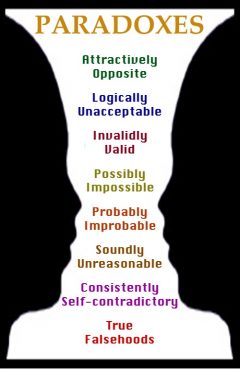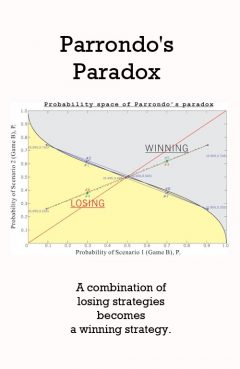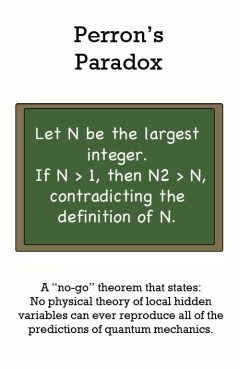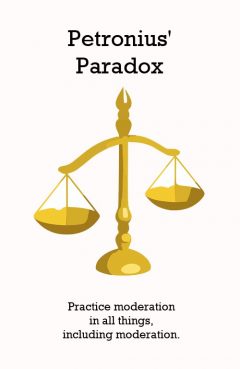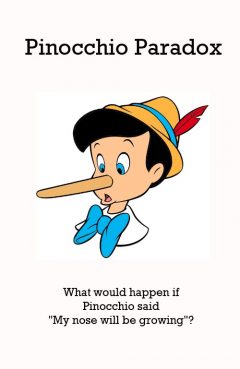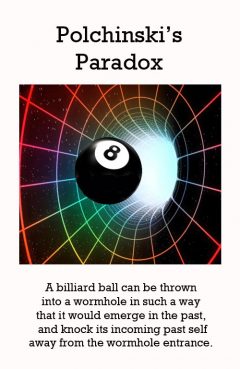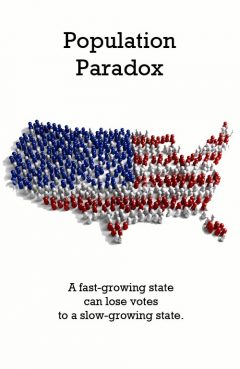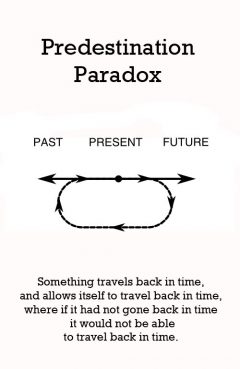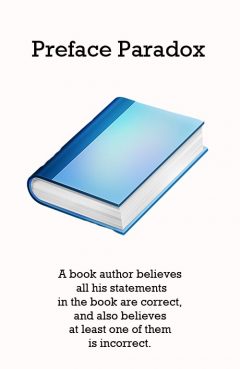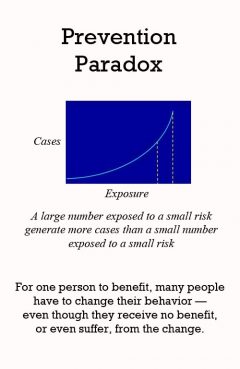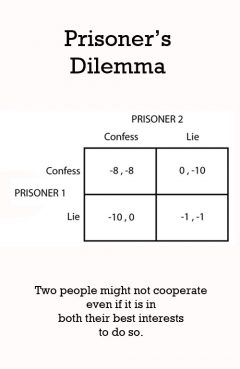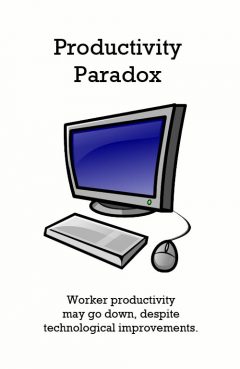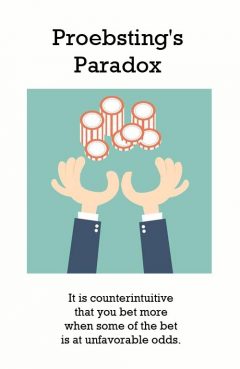Paradox of Value
Parrondo's Paradox
Release Date: //
Country of Release:
Length:
MPAA:
Medium: Paradox
Genre:
Release Message: It is possible to play two losing games alternately to eventually win. Authored by J. M. R. Parrondo.
Description: Parrondo's Paradox Parrondo's paradox, a paradox in game theory, has been described as: A combination of losing strategies becomes a winning strategy. It is named after its creator, Juan Parrondo, who discovered the paradox in 1996. A more explanatory description is: There exist pairs of games, each with a higher probability of losing than winning, for which it is possible to construct a winning strategy by playing the games alternately. Parrondo devised the paradox in connection with his analysis of the Brownian ratchet, a thought experiment about a machine that can purportedly extract energy from random heat motions popularized by physicist Richard Feynman. However, the paradox disappears when rigorously analyzed.
Perron's Paradox
Release Date: //
Country of Release:
Length:
MPAA:
Medium: Paradox
Genre:
Release Message: Let N be the largest integer. If N > 1, then N2 > N, contradicting the definition of N.
Description: Let N be the largest integer. If N > 1, then N2 > N, contradicting the definition of N. Hence N = 1 to illustrate the danger of assuming that the solution of an optimization problem exists.
Peto's Paradox
Release Date: //
Country of Release:
Length:
MPAA:
Medium: Paradox
Genre:
Release Message: Humans get cancer with high frequency, while larger mammals, like whales, do not -- one would expect larger organisms to be more predisposed to cancer.
Description: The observation, due to Richard Peto, that at the species level, the incidence of cancer does not appear to correlate with the number of cells in an organism. For example the incidence of cancer in humans is much higher than the incidence of cancer in whales. This is despite the fact that a whale has many more cells than a human. If the probability of carcinogenesis were constant across cells one would expect whales to have a higher incidence of cancer than humans.
Petronius' Paradox
Release Date: //
Country of Release:
Length:
MPAA:
Medium: Paradox
Genre:
Release Message: Moderation in all things, including moderation. Authored by Petronius.
Description: "Moderation in all things, including moderation" (unsourced quotation sometimes attributed to Petronius). ///// Practice moderation in all things. Including moderation.
Pinocchio Paradox
Release Date: 2//2001
Country of Release:
Length:
MPAA:
Medium: Paradox
Genre:
Release Message: What would happen if Pinocchio said "My nose will be growing"? Authored by Veronique Eldridge-Smith.
Description: The Pinocchio paradox arises when Pinocchio says "My nose grows now" and is a version of the liar paradox.[1] The liar paradox is defined in philosophy and logic as the statement "This sentence is false." Any attempts to assign a classical binary truth value to this statement leads to a contradiction, or paradox. This occurs because if the statement "This sentence is false" is true, then it is false; this would mean that it is technically true, but also that it is false, and so on without end.
Polchinski's Paradox
Release Date: //1990
Country of Release:
Length:
MPAA:
Medium: Paradox
Genre:
Release Message: A billiard ball can be thrown into a wormhole in such a way that it would emerge in the past and knock its incoming past self away from the wormhole entrance, creating a variant of the grandfather paradox. Authored by Joseph Polchinski.
Description: A billiard ball can be thrown into a wormhole in such a way that it would emerge in the past and knock its incoming past self away from the wormhole entrance, creating a variant of the grandfather paradox.
Pop Quiz Paradox
Population Paradox
Predestination Paradox
Release Date: //
Country of Release:
Length:
MPAA:
Medium: Paradox
Genre:
Release Message: A predestination paradox (also called causal loop, causality loop, and (less frequently) closed loop or closed time loop) is a paradox of time travel that is often used as a convention in science fiction.
Description: A predestination paradox (also called causal loop, causality loop, and (less frequently) closed loop or closed time loop) is a paradox of time travel that is often used as a convention in science fiction.
Preface Paradox
Release Date: //
Country of Release:
Length:
MPAA:
Medium: Paradox
Genre:
Release Message: A book author believes all his statements in the book are correct, and also that at least one of them is incorrect. Authored by David Makinson.
Description: The author of a book may be justified in believing that all his statements in the book are correct, at the same time believing that at least one of them is incorrect. The argument runs along these lines: It is customary for authors of academic books to include in the preface of their books statements such as "any errors that remain are my sole responsibility." Occasionally they go further and actually claim there are errors in the books, with statements such as "the errors that are found herein are mine alone." (1) Such an author has written a book that contains many assertions, and has factually checked each one carefully, submitted it to reviewers for comment, etc. Thus, he has reason to believe that each assertion he has made is true. (2) However, he knows, having learned from experience, that, despite his best efforts, there are very likely undetected errors in his book. So he also has good reason to believe that there is at least one assertion in his book that is not true. Thus, he has good reason, from (1), to rationally believe that each statement in his book is true, while at the same time he has good reason, from (2), to rationally believe that the book contains at least one error. Thus he can rationally believe that the book both does and does not contain at least one error.
Prevention Paradox
Release Date: //
Country of Release:
Length:
MPAA:
Medium: Paradox
Genre:
Release Message: For one person to benefit, many people have to change their behavior even though they receive no benefit, or even suffer, from the change. Authored by Geoffrey Rose.
Description: For one person to benefit, many people have to change their behavior -- even though they receive no benefit, or even suffer, from the change.
Prisoner's Dilemma
Release Date: //
Country of Release:
Length:
MPAA:
Medium: Paradox
Genre:
Release Message: Two people might not cooperate even if it is in both their best interests to do so. Authored by Merrill M. Flood and Melvin Dresher, with Albert W. Tucker.
Description: Two people might not cooperate even if it is in both their best interests to do so. The prisoner's dilemma is a standard example of a game analyzed in game theory that shows why two completely "rational" individuals might not cooperate, even if it appears that it is in their best interests to do so. It was originally framed by Merrill Flood and Melvin Dresher working at RAND in 1950. Albert W. Tucker formalized the game with prison sentence rewards and named it, "prisoner's dilemma" (Poundstone, 1992), presenting it as follows:
Productive Failure
Release Date: //
Country of Release:
Length:
MPAA:
Medium: Paradox
Genre:
Release Message: Providing less guidance and structure and thereby causing more failure is likely to promote better learning.
Description: Providing less guidance and structure and thereby causing more failure is likely to promote better learning.
Productivity Paradox (Solow Computer Paradox)
Release Date: //
Country of Release:
Length:
MPAA:
Medium: Paradox
Genre:
Release Message: Worker productivity may go down, despite technological improvements. Authored by Robert Solow.
Description: The productivity paradox was analyzed and popularized in a widely cited article by Erik Brynjolfsson, which noted the apparent contradiction between the remarkable advances in computer power and the relatively slow growth of productivity at the level of the whole economy, individual firms and many specific applications. The concept is sometimes referred to as the Solow computer paradox in reference to Robert Solow's 1987 quip, "You can see the computer age everywhere but in the productivity statistics." The paradox has been defined as the discrepancy between measures of investment in information technology and measures of output at the national level. It was widely believed that office automation was boosting labor productivity (or total factor productivity). However, the growth accounts didn't seem to confirm the idea. From the early 1970s to the early 1990s there was a massive slow-down in growth as the machines were becoming ubiquitous. (Other variables in country's economies were changing simultaneously; growth accounting separates out the improvement in production output using the same capital and labour resources as input by calculating growth in total factor productivity, AKA the "Solow residual".) The productivity paradox has attracted a lot of attention because technology seems no longer to be able to create the kind of productivity gains that occurred until the early 1970s. Some, such as economist Robert J. Gordon, are now arguing that technology in general is subject to diminishing returns in its ability to increase economic growth.
Proebsting's Paradox
Release Date: //
Country of Release:
Length:
MPAA:
Medium: Paradox
Genre:
Release Message: It is counterintuitive that you bet more when some of the bet is at unfavorable odds. Authored by Todd Proebsting
Description: In probability theory, Proebsting's paradox is an argument that appears to show that the Kelly criterion can lead to ruin. Although it can be resolved mathematically, it raises some interesting issues about the practical application of Kelly, especially in investing. It was named and first discussed by Edward O. Thorp in 2008. The Kelly criterion is an often optimal strategy for maximizing profit in the long run. Proebsting's paradox apparently shows that the Kelly criterion can lead to ruin. It is counterintuitive that you bet more when some of the bet is at unfavorable odds.
Pulsus Paradoxus (The Pulse Paradox)
Release Date: //
Country of Release:
Length:
MPAA:
Medium: Paradox
Genre:
Release Message: Sometimes it is possible to hear, with a stethoscope, heartbeats that cannot be felt at the wrist. Also known as the Pulse Paradox.
Description: Sometimes it is possible to hear, with a stethoscope, heartbeats that cannot be felt at the wrist. Also known as the Pulse Paradox.
Quantum Immortality
Quantum LC Circuit Paradox
Release Date: //
Country of Release:
Length:
MPAA:
Medium: Paradox
Genre:
Release Message: Energies stored on capacitance and inductance are not equal to the ground state energy of the quantum oscillator.
Description: Energies stored on capacitance and inductance are not equal to the ground state energy of the quantum oscillator.
